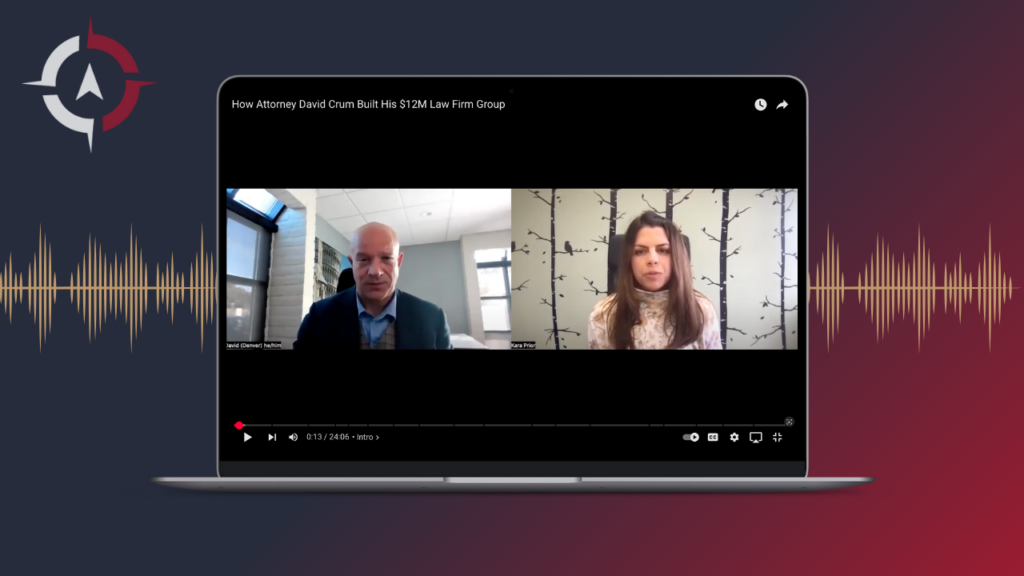Leveraging CRM Data to Supercharge Your Family Law Firm’s Email Marketing
- Lauren Sattler
When you think of email campaigns, you probably focus on the basics: the audience, the content, the timing, etc. You might even be familiar with how detailed creating an email marketing campaign can be. Crafting the perfect email involves a lot of thought and strategy, ranging from designing eye-catching visuals to writing compelling copy and segmenting your audience for maximum impact. But let’s talk about what happens after the campaign is launched. It might seem like activating an email campaign is the finish line, but in reality, it’s just the beginning of a more dynamic process. The true power of email marketing lies in what comes next—analyzing the results, interpreting the data, and continuously refining your approach to achieve better outcomes. The post-launch phase is where you can gain valuable insights, make data-driven adjustments, and truly connect with your audience.
Why CRM Data is Your Secret Weapon
Your CRM system is packed with valuable information about your clients – from contact details and case history to their preferences and interactions with your firm. When used right, this data can give you insights that help tailor your emails to meet your client’s specific needs, making your messages more relevant and compelling. It’s important to listen to your client’s feedback so that you can improve your communication with them and ensure their concerns are being addressed.
Analyze Your Campaign Performance
So you’ve created the content and officially launched your email campaign. What now? The next step after launching an email campaign is to analyze its performance by diving into the data and determining what’s working and what’s not. Regularly analyzing your email campaign performance is crucial. It allows you to make data-driven decisions and continually improve your strategies.
You can start by monitoring the basics like open rates, click-through rates (CTR), and conversion rates.
- Open Rate — Your Open Rate measures the percentage of email recipients who open a specific email
- What is considered a “good” open rate varies by industry. For example, the average email open rate in the legal industry is around 21%.
- Click-Through-Rate (CTR) — Click-Through-Rate is the percentage of people who click on at least one link in an email.
- The average CTR for the family law industry is 4.70%, while the average CTR for all industries is 2.91%
- A high CTR is a good indication that your content is relevant and engaging to your audience.
- Conversion Rates — the percentage of recipients who complete a desired action after receiving an email.
- In legal marketing, the desired action is usually booking a consultation with an attorney.
These metrics give you a clear picture of how well your emails are performing. For example, if your open rates are low, it might be time to rethink your subject lines or send times. If your click-through rates seem a bit low, it might be time to rethink the kind of content you are sending to figure out what type of content better resonates with your audience.
Utilize Your Data
Once you’ve analyzed your data and have a general sense of how things are performing, it’s time to put your findings to good use. For example, you might find that emails with a more personal tone outperform those that are more formal, or that including client testimonials boosts click-through rates. Instead of blindly following your hypothesis, you can actually test these theories based on the data you’ve gathered. You can take your data analysis a step further with A/B testing. A/B testing can be incredibly valuable for law firms. By testing different variations of subject lines, email content, and calls-to-action (CTAs), you can determine what resonates best with your audience.
Another important aspect is gathering client feedback. Use your CRM data to identify clients who regularly engage with your emails and ask for their input. This can provide insights into their preferences and help you refine your email law firm’s content. Additionally, track how different segments of your audience respond to various campaigns. This can reveal trends and help you tailor your messages more effectively.
Using Data to Build Stronger Client Relationships
Building and maintaining strong client relationships is crucial in family law. US Legal Marketing Group offers reputation management as a service available to clients, and reputation management has many components. Email marketing is an important component of relationship building when it comes to leveraging your CRM data. Personalized and timely email communications foster trust and show that you care about their case. One way to enhance these relationships is by sending check-in emails. Staying in touch with clients after their cases are closed is super important when it comes to improving the client experience. Follow-up emails can check in on their progress, offer additional support, and reinforce that your firm is there for them whenever they need it. This ongoing communication can turn past clients into long-term advocates for your firm, leading to referrals and positive word-of-mouth. Strategically timing these check-ins is key. It’s also a good idea to send check-in emails during your client’s case, immediately after it ends, and many months after the case ends. A simple touchpoint with the client can make clients feel valued and remembered. Not only will it strengthen the relationship, but it also allows you to boost your firm’s reviews and obtain the important feedback that you need to improve the client’s relationship — which is one of the main goals of CRM.
Educational content is another powerful tool to aid in building your relationships with clients. Providing valuable resources like E-books, courses, webinars, or Q&A sessions with your attorneys can help clients navigate their legal issues and feel more informed and supported. These are the items you need to work into your newsletters and regular communication to ensure that you’re delivering something of value to clients. For example, you might create a section of FAQs on child custody and send it to clients who are in the child custody practice area. You can then use CRM data to analyze the performance of this tailored content and strengthen your client communications. This positions your firm as a helpful resource and keeps clients engaged and appreciative of your support.
A common misconception about email marketing is that it’s “one and done” campaigns and email blasts, where you simply press send and watch the results come in. But this is not true, truly good email marketing is much more communicative. It’s a two-way street, between clients and firms. By leveraging CRM data to analyze campaign performance and build stronger client relationships, family law firms can create more impactful and effective email marketing strategies.
If you’re ready to start harnessing the power of your CRM, contact US Legal Marketing Group today.
Happy emailing!


